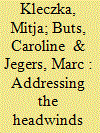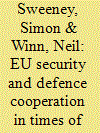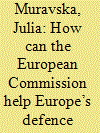| Srl | Item |
| 1 |
ID:
171645


|
|
|
|
|
| Summary/Abstract |
The European arms industry is challenged by several adverse “headwinds.” Fragmentation leads to costly duplications and, in conjunction with stagnating budgets and sharply increasing costs, prevents firms from exploiting economies of scale and learning. This is exacerbated by size differentials vis-a-vis the leading US arms manufacturers and competition from emerging producers. As some “headwinds” are self-enforcing, far-reaching industrial and policy responses are required to improve the industry's outlook. As exports may not indefinitely compensate for low domestic demand, there is an economic imperative for further cross-border collaboration and consolidation. Despite various EU policy initiatives, progresses regarding the European Defence Equipment Market and strengthening the European Defence Technological Industrial Base have been relatively slow. It remains to be seen whether the European Defence Fund will be the proclaimed “game-changer,” raising competitiveness of the European arms industry. At the same time, the UK's withdrawal from the EU adds uncertainties.
|
|
|
|
|
|
|
|
|
|
|
|
|
|
|
|
| 2 |
ID:
171630


|
|
|
| 3 |
ID:
173160


|
|
|
|
|
| Summary/Abstract |
Has the United Kingdom(UK) Brexit referendum been a catalyst for more European Union security cooperation? How significant are post-referendum initiatives in security and defence? What are the implications of Brexit for European Union (EU) and UK security and defence? This article analyses EU post-Brexit strategic choices following the launch of the EU Global Strategy (2016). EU autonomy in security and defence requires close cooperation with third countries, including Norway and post-Brexit UK. It remains to be seen whether the EU and the UK can forge a new bespoke security and defence relationship that delivers mutual benefits through shared strategic ambitions, while also protecting their various interests. We suggest there will be serious collateral damage to UK-EU security and defence cooperation if post-Brexit trade negotiations descend into acrimony and mistrust, especially in the event of “no-deal” once the “transition period” ends. This would undermine European security and the EU’s quest for strategic autonomy in world affairs and have serious implications for both UK and EU security. We conclude that the EU needs to work with the UK on a plan to achieve global strategic autonomy, or both risk reduced influence in the wider world in the years ahead.
|
|
|
|
|
|
|
|
|
|
|
|
|
|
|
|
| 4 |
ID:
181640


|
|
|
|
|
| Summary/Abstract |
European Defence is in a new and formative phase in which the European Union’s long list of defence acronyms has steadily grown. One of the most noticeable new policy initiatives is the European Commission’s European Defence Fund (EDF). This article consequently investigates and outlines the establishment of the European Defence Fund and the European Commission’s new role within the field of security and defence through the lens of revised neofunctionalism. This article thus asks how and through what steps did the EDF come about; and secondly how can neofunctionalism explain the dynamics involved in the establishment of the European Defence Fund. The analysis uses a process-tracing method and draws on interviews with relevant policymakers and officials in Brussels as well as official EU documents. The conclusions argue that the ever-increasing involvement of the European Commission in a policy field close to national sovereignty is starting to blur the traditional dichotomy between intergovernmental and supranational decision-making. In this way, this study contributes to the growing literature on the weakening of intergovernmentalism within the EU security and defence policy field.
|
|
|
|
|
|
|
|
|
|
|
|
|
|
|
|
| 5 |
ID:
177042


|
|
|
|
|
| Summary/Abstract |
The European Commission's proposal for the €13 bn European Defence Fund (EDF) to incentivise collaborative defence research and capability development projects with EU funding was an ambitious statement of policy intent to drive forward European defence cooperation. However, the summer 2020 EU budget negotiations left it with only about 60% of that amount over the 2021-2027 period. This debate contribution argues that despite this curtailment in resource and ambition, the European Commission can still maximise the EDF's impact to benefit European defence industry by ensuring that the various defence industrial policy activities it is already leading are achieving their full potential, incentivising EU governments to acquire and use the capabilities developed through the Fund, and maintaining coherence amongst existing research projects, capability development projects, and joint capability requirements.
|
|
|
|
|
|
|
|
|
|
|
|
|
|
|
|